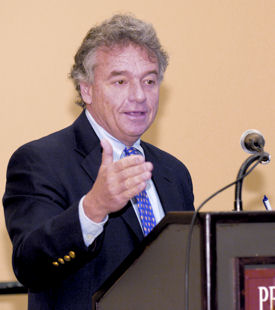Sharing knowledge is part of a modern Hippocratic Oath
Recent scandals challenge physicians' abilities to embrace the incredible volume of information information and translate new research into bedside practice.
Has the Hippocratic Oath of the 4th century B.C. become the “Hypocritical” Oath of the 21st century? Can an oath written a millennium ago continue to have any relevance to the practice of medicine today? Over the next several issues, I would like to explore a new version of the oath written for modern medicine and the relevance it brings to present day professional responsibilities, duties and challenges.
The first paragraph of this new version reads, “I will respect the hard-won scientific gains of those physicians in whose steps I walk, and gladly share such knowledge as is mine with those who are to follow.”
Respect for others' knowledge inherently requires trust that the information is unbiased and truthful. Unfortunately, recent scandals have engendered skepticism of sources once thought above reproach. Repercussions of the 2004 rofecoxib (Vioxx) recall, triggered by cardiovascular risks that had been discovered earlier but kept under wraps for years, continue to shake the scientific and medical communities. Then, there are the several leading psychiatric researchers who failed to disclose millions of dollars in deals from the very pharmaceutical companies whose drugs were the subject of their research. Most recently, Scott Reuben, MD, a prominent anesthesiologist, confessed to falsifying numerous clinical studies regarding pain management.
Greed and deception, though problematic in our private, for-profit sectors, are hemlock for the medical profession. A lack of trust in clinical information creates a pervasive atmosphere of skepticism and suspicion that bottlenecks our advancement and understanding of medical science. The College was the first medical organization to respond to this issue of conflicts of interest and develop a policy on physician-industry relations in 1990.
In its 2007 revisions of that original statement on physician-industry relations, the College's Ethics, Professionalism and Human Rights Committee emphasized that the free exchange and effective use of an expanding base of medical knowledge and ideas requires at its most fundamental level an endorsement and validation of the principles of full disclosure, transparency and avoidance of conflicts of interest.
Beyond trust, finding time—a physician's most valuable and precious asset—to effectively process and use important published medical information is a constant and ongoing challenge. College products such as MKSAP, PIER, and ACP Journal Club are examples of tools the College has developed to help physicians quickly distill new information and answer clinical questions on demand. These tools are benefits of College membership that you can literally take with you into the examining room every day.
Going forward, the College continues to improve upon ACP Journal Club with Journal Club Plus allowing members to review evidence-based summaries of articles related to topics of personal interest. In the development stages are personalized ACP Web portals allowing the user to create links and have easy access to a whole range of information sources that are personalized to his/her needs and interests.
In this era of social networking through media such as Facebook, we increasingly expect information to be brought to us through online dialogue and relationships. Recognizing this paradigm shift in knowledge sharing, the College is organizing all of its extensive educational content into a Wiki model called Osler. This will allow easy access to a vast medical database that helps answer clinical questions and provides opportunity to contribute one's own knowledge regarding a medical subject.
The most important person with whom we need to “gladly share” our knowledge is the patient. Health literacy and the ability to understand, process and use medical information is a huge and costly challenge. Yet, health literacy is critical to patient autonomy, a cornerstone principle of the Charter for Medical Professionalism. Patient-centered medical decision making requires actively engaging patients in managing their health. Specific challenges for the internist include educating the patients about self-management of chronic diseases and proper use of medications.
To help us meet the challenge, the ACP Foundation was incorporated in 1999 with a mission to address health literacy. They have been publishing HEALTH TiPS on an array of important clinical areas to give patients key points of understanding about the clinical issues, as well as important questions to ask physicians for successful self-management. After much focus group research with patients, the Foundation collaborated with health literacy experts to create a highly effective and very popular patient guide and Web portal for understanding and managing diabetes. Most recently, they have replicated those tools in addressing COPD. For more information on HEALTH TiPS, the Diabetes Patient Guide and the COPD Patient Guide, go to foundation.acponline.org.
In the post-Vioxx age, our challenges are knowing when to embrace the new medical knowledge of others, how to absorb the incredible volume of new information, and how to translate new research developments into bedside practice. We are challenged to be an effective conduit of that information to others, especially our patients, who need it the most. In meeting these challenges of our Hippocratic Oath, having the ACP and the ACP Foundation as partners is exceedingly worthwhile.




